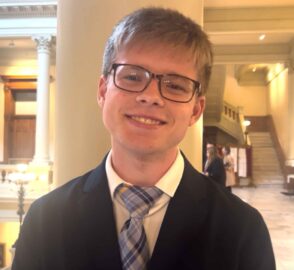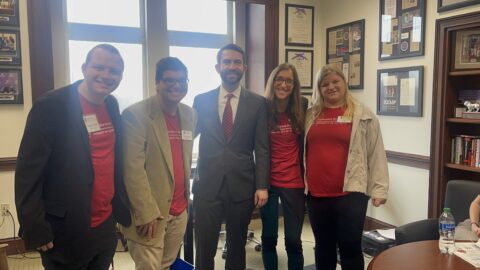Self-Advocates Speak at the Capitol During GCDD’s Legislative Advocacy Days
The Georgia Council on Developmental Disabilities (GCDD) hosted its annual Advocacy Days at the Capitol during the 2024 legislative session, which began in January. Using the power of self-advocates from Uniting for Change, GCDD was able to educate and inform lawmakers on issues affecting the developmental disability (DD) community throughout Georgia.
GCDD hosts three separate Advocacy Days each year during the Georgia legislative session, IPSE Day, Waivers and Wages Day, and Employment Day. IPSE Day focuses on advocating to increase funds for IPSE grants. Waivers and wages day address the 7,000 Medicaid waitlist, as well as wages for direct support professionals (DSPs) in Georgia. Employment Day focuses on ending the 14c certificate, which makes it legal to pay people with disabilities subminimum wages and making Georgia a State as a Model Employer state.
This feature highlights self-advocates from across the state of Georgia and their experiences advocating at the capitol during each of the three Advocacy Days.
IPSE Day
Inclusive Post Secondary Education (IPSE) is the first of GCDD’s Advocacy Days each year. This year, self-advocates went to the Capitol to ask their state legislators to fully fund the Inclusive Post-Secondary Education (IPSE) grants and to make sure that all Georgians with intellectual disabilities (ID) have the opportunity to attend the IPSE college program of their choice.
Below are personal testimonies of a few self-advocates, who are students representing several of the different IPSE programs in Georgia, on why and what they advocated for this legislative session to support the success of their IPSE program.
 Griffin Hatcher, EXCEL at the Georgia Institute of Technology“We came for Advocacy Day with my EXCEL family. We are trying to make a difference in our community and we’re trying to get our voices heard. That doesn’t matter because of our disability, we can still advocate and we have the same intuition like everyone else does, and we’re just trying to get the word out. We can get jobs, we can live the way we want, and we want to let everyone know that.”
Griffin Hatcher, EXCEL at the Georgia Institute of Technology“We came for Advocacy Day with my EXCEL family. We are trying to make a difference in our community and we’re trying to get our voices heard. That doesn’t matter because of our disability, we can still advocate and we have the same intuition like everyone else does, and we’re just trying to get the word out. We can get jobs, we can live the way we want, and we want to let everyone know that.”
 Derek Bree, IDEAL at Georgia State University
Derek Bree, IDEAL at Georgia State University
“I’m learning different things with film and media, like writing and acting, and a little bit of directing. I am at the Capitol today to advocate for the IDEAL program so they can get all the help they need to continue to strive. It’s a great, great place to help everybody with disabilities to easily be their best self and achieve their dreams, and I wanted them to be able to continue to do that for years to come.
By being at the Capitol, it’s helped me by being able to talk about things with different high ranking folks and different positions of authority. I am passionate about advocating for different folks with disabilities, for them to get a chance to thrive and be their best self and live their best life.”
Peyton Ashcraft, Destination Dawgs at the University of Georgia

“So I’m in Destination Dawgs and it’s my favorite program in the whole wide world. I met new friends because of it. It helps [people with disabilities] meet and socialize with people, and we meet new people too. We can bring new friends over there to be a part of the program and then it helps with all the disabilities.”
Waivers and Wages Day
Self-advocates went to the Capitol to talk to their state representatives about reducing the Medicaid waitlist and increasing wages for Direct Support Professionals (DSPs).
Nandi Isaac, a longtime self-advocate and GCDD Council Member, is a member of Uniting For Change. She’s lost count of how many times she’s been at the Capitol advocating on behalf of people with disabilities, but her work isn’t finished. She attended these advocacy days to talk about DSP wages. While Isaac lives independently, her daily life relies heavily on the support of DSPs.
 “I want to talk to my lawmakers about the DSP shortages and waivers. It is important because right now there are [DSP shortages] and there is less pay for them. It is really hard with their lives, and they can’t do everything,” said Isaac, who is from Macon.
“I want to talk to my lawmakers about the DSP shortages and waivers. It is important because right now there are [DSP shortages] and there is less pay for them. It is really hard with their lives, and they can’t do everything,” said Isaac, who is from Macon.
While at the Capitol, Isaac also reflected and remembered GCDD’s former public policy director, Dawn Alford, who was a force in disability advocacy and led Advocacy Days when GCDD first began hosting Advocacy Days.
Kristian Sherman, from Albany, attended his first-ever Advocacy Day this year to advocate for waivers and wages.
“It was an important day for me to attend so I could show support to my fellow community,” said Sherman.
While he himself does not have a waiver, he feels reducing the waitlist and providing waivers for the disability community is important because, “it allows us to become more independent in our community.”
Additionally, Sherman was advocating for increasing wages for DSPs. “People working outside of the DSP community get paid fairly, and we should have no more discrimination against DSPs.” He does not have a DSP.
While he was not able to meet his state representative, Sherman wants to make sure that Georgia lawmakers know one simple message: “We may be disabled, but we work just as hard and are dependable. So the waivers give opportunities for fairness,” he shared.
Employment Day
Self-advocates came to the Capitol to support Georgia as a Model Employer (Senate Bill 384) and to support ending 14c (House Bill 1125), the outdated practice that allows employers at community rehabilitation programs to pay people with disabilities less than minimum wage.

LJ Young, a self-advocate with Uniting for Change, shared why he was at the Capitol to advocate for the ending of 14(c) subminimum wage, allowing people with disabilities to earn competitive wages.
“We are the only marginalized group that is being paid under minimum wage and it should be illegal. Just like it’s illegal to discriminate based on race, sex, disability, it should be illegal to be paid [under] minimum wage just because you have a disability,” said Young.
Young said that being in a career and not just a job is very important because people want something to be motivated, to push themselves to be more.
“We want to be number one in the country for employers to be hiring people with disabilities,” said Young. “That is my goal. I want us to be number one. I want us to be above California, above New York, above all these other states that have already implemented this probably for 10, 15 years. If we can jump them, I could brag about it to my friends. I’d be like, we’re number one.”
Uniting for Change is a statewide, grassroots network of self-advocates, allies, and supporters in Georgia that was founded in 2019 through a grant from Georgia Council on Developmental Disabilities. This network is committed to advocating, organizing, showing up and being heard. Uniting for Change members seek to share information, create opportunities and influence change. www.uniting4change.org